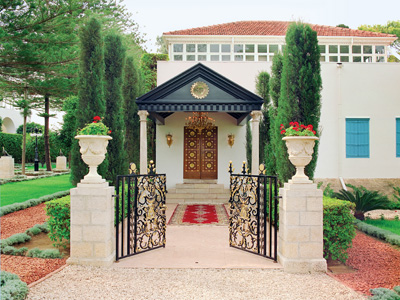

Entrance to the Shrine of Bahá’u’lláh, burial place of the Founder of the Bahá’í Faith, near Akka, Israel. To Bahá’ís, it is the holiest spot on earth.
© Baha’i World Centre
History 2 - Bahá’u’lláh (1817-1892)
Bahá’u’lláh is regarded as the Prophet-founder of the Bahá’í Faith and the Manifestation of God for today. He was born Mírzá Husayn-‘Alí on 12 November 1817 to a noble family of Nur in Mazandaran, Iran. He became a follower of the Báb in 1844 and became a Bábí leader. Persecutions raged against Bábís in 1852 and Bahá’u’lláh was imprisoned in an underground dungeon where he first received a revelation that he was the promised one foretold by the Báb. On his release, he and his family were banished from Iran through the Ottoman Empire for the next 15 years, culminating in his imprisonment in the prison city of Akka. The last years for Bahá’u’lláh were spent under house arrest at the mansion of Bahji, near Akka, where he passed away in 1892, aged 74. The writings of Bahá’u’lláh comprise thousands of letters (called Tablets) and several books, many of which have been translated into English.
Ready for more?
not all...
quizzers. Try to win a coveted spot on our Hall of Fame Page.






